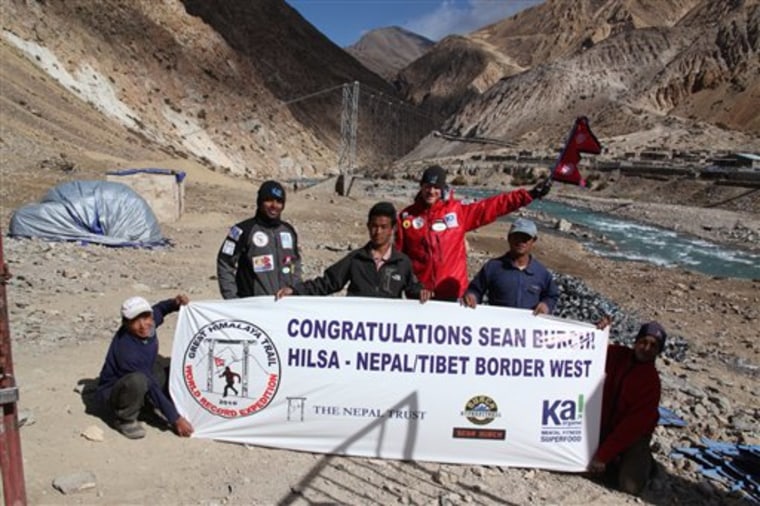A trekker's dream has become a reality in Nepal.
In a bid to promote tourism, the mountainous nation has made it possible to hike from one end of the country to the other on the 1,000 or so miles of the enticing but intimidating-sounding Great Himalaya Trail.
Chances are, you want be able to do it as fast as American adventurer Sean Burch, who finished the whole thing in 49 days.
Forty-nine days, 6 hours, 8 minutes, to be exact.
"I still have nerve damage in my feet. I still can't feel my toes," said Burch, back home in Virginia. "This is the ultimate trekking trail in the world. It raises the bar on anything I've ever done."
Burch got sick a half-dozen times, walked on bloody feet after encountering leeches, managed staggering elevation gains, ate more than 7,000 calories per day, met people who had never seen a Westerner and had to be pulled out of a river after falling in — with hypothermia a real danger. He had daily help from a dozen or so porters, who would carry supplies and meet him at certain points.
The government of Nepal was so impressed it named him a goodwill ambassador and verified the achievement for consideration in the Guinness Book of World Records.
"It's definitely a very tough challenge to keep going over that terrain for 49 days," said Paul Stevens of the Tourism SNV Netherlands Development Organization, a nonprofit group that promotes the trail.
Burch is one of those how-does-he-do-that adventurers always looking to achieve an extreme first. He won the 2004 North Pole Marathon and a year later set the record for fastest ascent of Africa's Mount Kilimanjaro, landing him a place in the Guinness book until the mark was broken in 2007. In 2009, he completed the fastest winter ascent of Japan's Mount Fuji.
Now 40, he has no plans to slow down.
"Physically, yes, it's harder. I was in better shape than I am now," Burch said. "But mentally I'm in better shape. To me, that's everything, is the mental aspect of it, how to put yourself through this to get done with it."
Burch completed his Nepal trek in October, and this week the Great Himalaya Trail welcomed its first commercial expedition. The trail is a focal point as the landlocked, mountainous country launches into a national year of tourism in 2011. Mount Everest is obviously still the main draw, but the Nepalese would like to get their visitors to explore other regions to help boost local economies.
Burch said he delighted in staying with the locals — one man let him sleep in a bed that belonged to a great-great-grandfather — but one reason he was sick so often was because his hosts didn't practice Western methods of hygiene, such as washing hands or food.
"What I wanted to do was to reach those that are in the hidden Himalayas, that are living the way they've done for 1,000 years," Burch said. "These people, they have nothing. They don't have regular health care. They don't have sanitation. They don't know nothing about it. Tourism in Nepal, that's a way to bring money to these remote areas."
